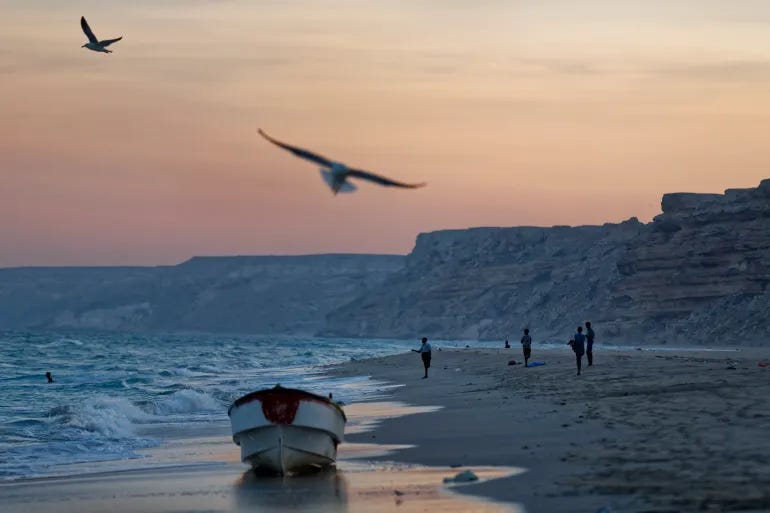Hijackers of Chinese Ship Off Somali Coast Explain Actions: "We Are Not Pirates, But Victims of Foreign Trawlers"
After seven weeks of captivity, hijackers in Puntland claim foreign fishing vessels are threatening local livelihoods, while China condemns the attack as "vicious."
Mogadishu, Somalia – Liban Hassan, a 32-year-old fisherman from Puntland, Somalia, has spent much of his life on the waters off the northeastern coast of the country. But last year, the tide turned when he and a group of locals took control of a Chinese fishing trawler, holding its crew hostage for seven weeks.
This week, the crew and ship were safely released, but the hijacking has sparked a debate that reveals growing frustration among local fishermen who feel their livelihoods are under siege from foreign trawlers.
The Chinese embassy in Somalia has strongly condemned the hijacking, calling it a "vicious action" that jeopardized both the safety of the crew and international maritime security. Yet, Liban and others in Puntland maintain they are not pirates, but rather a community fighting to protect their resources.
"We are not pirates. We are a community under siege," Liban told Al Jazeera in December, speaking from aboard the hijacked vessel. "Fishing is our life, but foreign ships are taking everything from our seas."
The issue of illegal fishing by foreign vessels has long plagued Somalia since the collapse of its central government in 1991, which left its territorial waters unprotected. While piracy declined after the deployment of international naval forces, foreign trawlers began taking advantage of the lack of oversight, depleting fish stocks and polluting local waters.
Liban describes how foreign ships often come too close to shore, devastating local resources. "When we go out at sea, they shoot at us, destroy our boats, and prevent us from feeding our families," he claimed, speaking of foreign trawlers in general.
The hijacking occurred in November 2024 when Liban and his group seized the Chinese vessel, which was fishing within Somali waters near Garmaal, just a few miles from shore. Somali law prohibits foreign trawlers from coming closer than 24 nautical miles (44.5 km) from the coastline, yet the Chinese trawlers ignored this regulation.
The group’s actions were swift, overpowering the two Somali guards onboard and taking control of the ship. "As soon as we stepped foot on the ship, our guns were already drawn," Liban recounted. "We seized three AK-47s and three bulletproof vests."
The hijackers initially rejected ransom offers, holding out for more support. However, after weeks of negotiation, Puntland authorities, along with clan elders, brokered an agreement, leading to the trawler’s release on January 13. The crew of 18 was set free without injury, as confirmed by EUNAVFOR Atalanta, which had been monitoring the situation.
Local fishermen, including elders, have expressed support for Liban’s cause, though not necessarily his methods. Some acknowledge that while foreign trawlers are damaging local resources, piracy exacerbates the situation. "Pirates are more detrimental to our society," said Garad Jama Isse, a tribal leader. "They exploit the youth, sending them out to sea with false promises of wealth. They are no different than armed militias causing destruction on land."
Despite the differing opinions on piracy, the widespread sentiment among locals is clear: foreign ships are plundering Somalia's resources with little consequence. "What it would take 100 fishermen to capture in six months, trawlers can catch in a single day," Liban said.
The hijacking incident highlights deeper frustrations with a lack of governance and accountability. Puntland's local leaders and fishermen claim that powerful figures in the Somali government are colluding with foreign trawlers, providing illegal licenses for foreign boats to fish within Somali waters. These unregulated practices contribute to the depletion of marine resources, while local fishermen are left to watch from the shore.
"These foreign trawlers are looting our seas, and we are powerless to stop them," said Mohamud Khalid Hassan, a town elder from Eyl. "We can only watch as they destroy our boats and pollute our waters."
As Somalia continues to struggle with illegal fishing and its impacts, Liban and his group remain committed to their cause, despite international condemnation. "We depend on the seas for our livelihoods," he said. "These foreign trawlers have prevented us from feeding our families. We can’t live like this. It’s like being a prisoner in your own home."
The hijacking may be over, but the tension over Somalia's maritime resources remains unresolved, raising questions about the future of the region's waters and the livelihoods of its people.


